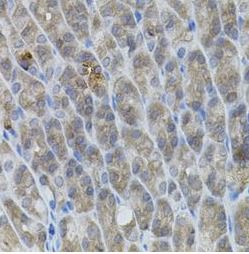| Clonality | polyclonal |
| Host | Rabbit |
| Specificity | Human, Mouse, Rat |
| Tested Application | ELISA, WB, IHC |
| Delivery Time | 2 to 4 working days |
| Isotype | IgG |
| Form | liquid |
| Purification | Immunogen affinity purified |
| Purity | ≥95% as determined by SDS-PAGE |
| Uniprot ID | P49459 |
| Gene ID | |
| Calculated MW | Refer to figures |
| Ссылка на страницу на сайте производителя | ссылка |
| Инструкция | PDF |
| Storage | PBS with 0.02% sodium azide and 50% glycerol pH 7.3 , -20℃ for 12 months (Avoid repeated freeze / thaw cycles.) |
| Background | The modification of proteins with ubiquitin is an important cellular mechanism for targeting abnormal or short-lived proteins for degradation. Ubiquitination involves at least three classes of enzymes: ubiquitin-activating enzymes, ubiquitin-conjugating enzymes, and ubiquitin-protein ligases. This gene encodes a member of the E2 ubiquitin-conjugating enzyme family. This enzyme is required for post-replicative DNA damage repair, and may play a role in transcriptional regulation. Mutations in this gene are associated with mental retardation. Alternative splicing results in multiple transcript variants. |
| Immunogen | ubiquitin-conjugating enzyme E2A (RAD6 homolog) |
| Synonyms | HHR6A, HR6A, RAD6 homolog A, RAD6A, UBC2, UBE2A, Ubiquitin carrier protein A, Ubiquitin protein ligase A |
| Recommended dilution | WB: 1:500 - 1:2000; IHC: 1:50 - 1:100 |
Immunohistochemistry of paraffin-embedded mouse stomach using FNab09163(UBE2A antibody) at dilution of 1:50
 |
HEK-293 cells were subjected to SDS PAGE followed by western blot with FNab09163(UBE2A antibody) at dilution of 1:1000
 |
| | |
